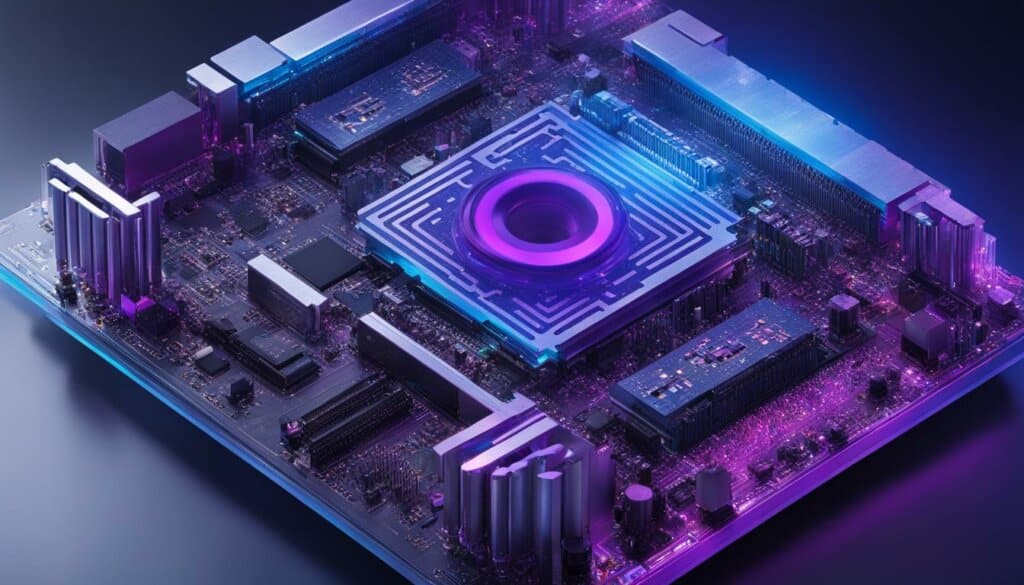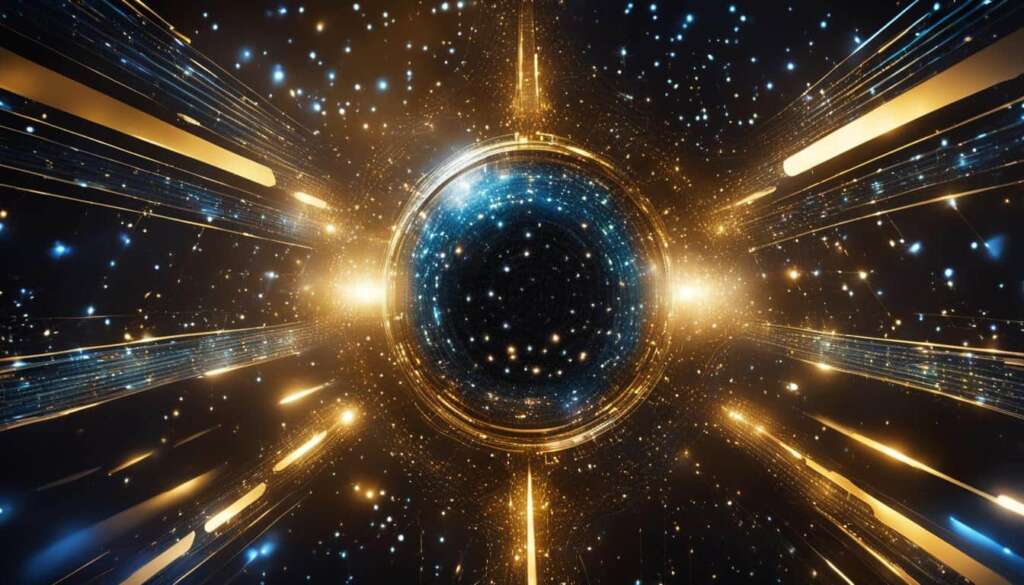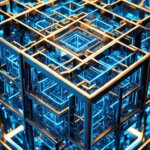Table of Contents
Welcome to our Quantum Computing Basics Guide, where we will demystify the complex world of quantum computing and provide a simple explanation of its key concepts. Whether you’re an aspiring quantum programmer or simply curious about the potential of this revolutionary field, this guide will equip you with the fundamental knowledge you need to understand quantum computing.
Quantum computing is a cutting-edge discipline that explores the principles of quantum mechanics to create powerful computers capable of solving complex problems. Unlike classical computers that use bits represented as ones and zeroes, quantum computers utilize quantum bits, or qubits, which take advantage of quantum superposition and entanglement.
In quantum computing, qubits can exist in a state of superposition, meaning they can represent both 1 and 0 simultaneously. This allows quantum computers to perform parallel computations, exponentially increasing their computational power as the number of qubits and the degree of entanglement between them grows.
Quantum algorithms, specially designed for quantum computing, make use of these unique properties to solve problems that are intractable for classical algorithms. Some of the most well-known quantum algorithms include Shor’s algorithm for factoring large integers and Grover’s algorithm for database searching.
In addition to quantum algorithms, quantum information processing is another significant application of quantum computing. It involves the manipulation and transmission of quantum information, which has the potential to revolutionize fields such as communication, simulation, and data storage.
However, quantum computing is still in its early stages of development. Most current quantum computers are noisy intermediate-scale quantum (NISQ) platforms, which are prone to qubit errors and quantum decoherence. Overcoming these challenges and achieving a quantum advantage over classical computers is the goal of ongoing research and advancements in the field.
Stay tuned for the next sections of our guide, where we will delve deeper into the basics of quantum computing, quantum algorithms, quantum programming, and the future impact of this exciting field.
The Basics of Quantum Computing
Quantum computing is based on the principles of quantum mechanics, a branch of physics that describes the behaviour of particles at the atomic and subatomic level. Unlike classical computers that use bits, quantum computers use qubits to represent and process information.
Quantum algorithms are step-by-step procedures that leverage quantum operations such as superposition and entanglement to perform computations. Represented as circuits, these quantum programs apply gates to qubits, executing specific operations. In contrast to classical computing, quantum programming is probabilistic, leading to results that are subject to random variation.
Quantum Algorithms and Applications
Quantum algorithms are specifically designed to take advantage of the unique properties of quantum computing. They are powerful tools that have the potential to revolutionize various fields and industries.
One notable quantum algorithm is Shor’s algorithm. It is a remarkable breakthrough that can factor large integers exponentially faster than classical algorithms. This has significant implications for cryptography as it renders many current encryption methods vulnerable. Shor’s algorithm has the potential to disrupt the field of cryptography, necessitating the development of new secure algorithms to ensure data privacy and protection.
Another influential quantum algorithm is Grover’s algorithm. It offers faster time complexity for database searching compared to classical algorithms. By leveraging quantum superposition and interference, Grover’s algorithm enables rapid data retrieval from large databases, which has implications for optimization and array searching tasks.
These quantum algorithms open up new possibilities and have the potential to transform various fields. For example, in the field of cryptography, Shor’s algorithm can break existing encryption methods, prompting the need for new and secure algorithms. In optimization, Grover’s algorithm offers faster search capabilities, allowing for more efficient solutions to complex problems.
Furthermore, quantum information processing is another important application of quantum computing. It involves the manipulation and transmission of quantum information. This has the potential to enhance communication, simulation, and data storage capabilities. Quantum information processing has the ability to process vast amounts of information in parallel, providing faster and more efficient solutions to complex problems.
In summary, quantum algorithms like Shor’s algorithm and Grover’s algorithm offer unprecedented computational power in solving complex problems. Quantum information processing opens up new possibilities for communication and data storage. The applications of these algorithms have the potential to revolutionize fields like cryptography, optimization, and quantum information processing.
Quantum Programming and Implementation
Quantum programming is the process of writing code that specifies the sequence of quantum operations to be performed on qubits. These operations are essential for harnessing the power of quantum computers to solve complex problems. In quantum programming, quantum programs are represented as circuits, where gates are used to apply specific operations to the qubits.
Gates are fundamental building blocks in quantum computing, analogous to logic gates in classical computing. They enable the manipulation and transformation of quantum states. Some commonly used quantum gates include the Hadamard gate, CNOT gate, and Pauli gates. These gates can implement operations such as superposition, entanglement, and measurement.
An example of a simple quantum program is the creation of a quantum superposition. This can be achieved by applying the Hadamard gate to a single qubit. The Hadamard gate puts the qubit into an equal superposition of 0 and 1, allowing it to simultaneously exist in both states.
“Applying the Hadamard gate to a qubit creates a quantum superposition.”
To implement quantum algorithms, access to quantum computers is essential. IBM provides quantum computers through their IBM Quantum Experience platform. Quantum programmers can run their programs on real-world quantum computers or use simulators to test and debug their code. The availability of IBM quantum computers allows developers to experiment and explore the potential of quantum computing.
When implementing quantum algorithms on actual hardware, it’s important to consider the noise and imperfections present in the quantum system. The behavior of a quantum program on a real quantum computer can differ from the results obtained through simulation. Noise in the quantum system can affect the accuracy and reliability of the computation. It is a challenge that quantum programmers need to address in order to obtain accurate results.

Quantum Programming Example: Quantum Teleportation
One notable example of quantum programming is the implementation of quantum teleportation. Quantum teleportation allows the transfer of quantum information from one qubit to another, without physically moving the qubit itself.
To perform quantum teleportation, a sequence of quantum gates and measurements are applied to a pair of entangled qubits, along with the qubit to be teleported. This process allows the quantum state of the original qubit to be transferred to the target qubit.
The following table showcases the quantum gates used in the quantum teleportation circuit:
| Quantum Gate | Operation |
|---|---|
| Hadamard gate | Puts qubits into superposition |
| CNOT gate | Generates entanglement between qubits |
| Pauli gates (X, Y, Z) | Adjusts the quantum state of qubits |
The implementation of quantum teleportation involves intricate quantum programming to manipulate and transfer the quantum information. It demonstrates the power of quantum programming in achieving tasks that are not possible with classical computing alone.
Challenges and Limitations of Quantum Computing
Quantum computing is still in its early stages of development, and there are several challenges and limitations that need to be overcome. One major challenge is dealing with qubit errors and noise in the quantum system. Quantum computers are currently noisy intermediate-scale quantum (NISQ) platforms, which means that their qubits are error-prone and can be affected by external disturbances.
Qubit errors occur due to many factors, including imperfect manufacturing processes, electromagnetic interference, and thermal fluctuations. The presence of errors in qubits can significantly impact the accuracy and reliability of quantum computations. To mitigate these errors, researchers are exploring various error correction techniques and fault-tolerant designs.
Noise in quantum systems can also lead to quantum decoherence, which is another significant challenge. Quantum decoherence refers to the loss of quantum information over time as qubits interact with their environment. This interaction causes the delicate quantum states to degrade, making it difficult to preserve the coherence necessary for performing quantum computations.
Overcoming these challenges requires advancements in qubit technology, error correction techniques, and system engineering. Researchers are exploring different qubit designs, such as superconducting qubits, trapped ion qubits, and topological qubits, to enhance their performance and reduce susceptibility to errors and noise. Developing error correction codes that can effectively detect and correct errors is also crucial in building robust and reliable quantum systems.
Quantum computing is a delicate dance between controlling qubits and mitigating errors. As we strive to develop more stable qubits and improve the scalability of quantum systems, we move closer to unlocking the full potential of quantum computing.
Advances in quantum error correction and fault-tolerant designs are imperative for building quantum computers that can perform complex computations accurately and consistently. Researchers are also exploring innovative approaches, such as machine learning and hybrid quantum-classical algorithms, to mitigate the impact of errors and improve the overall performance of quantum systems.
Despite the challenges and limitations, the field of quantum computing is progressing rapidly. Ongoing research and collaboration among scientists, engineers, and industry leaders are driving advancements in quantum technology.
Next, we will explore the future of quantum computing and the potential it holds. But before we delve into the possibilities, let’s examine quantum programming and implementation in the next section.
The Future of Quantum Computing
The future of quantum computing holds immense promise as researchers and scientists strive to achieve a quantum advantage. This entails developing quantum computers capable of solving problems that classical computers find intractable. To achieve this, the focus is on increasing the quantity and enhancing the quality of qubits in quantum processors.
As the field attracts more quantum programmers, there is potential for the discovery of efficient quantum algorithms that can address complex problems with remarkable efficacy. This continuous exploration and innovation in quantum algorithms has the power to revolutionize various industries.
Quantum computing has the potential to transform industries such as medicine, materials science, cryptography, and weather prediction.
The medical field stands to benefit greatly from quantum computing. With its immense computational power, quantum computers can assist in simulating and analyzing complex molecular interactions, leading to breakthroughs in drug discovery and development.
In materials science, the ability of quantum computing to design and discover materials with specific properties has tremendous implications. It opens up new avenues for creating advanced materials with enhanced characteristics for various applications.
Quantum computing also has significant implications for cryptography. Traditional encryption methods may become vulnerable, necessitating the development of new secure algorithms that can withstand the computational capabilities of quantum computers.
Furthermore, quantum computing has the potential to enhance weather prediction models, enabling better forecasting accuracy and contributing to improved disaster preparedness and mitigation strategies.
Industries Impacted by Quantum Computing
| Industry | Potential Impact |
|---|---|
| Medicine | Drug discovery and development, molecular simulation |
| Materials Science | Advanced material design, property optimization |
| Cryptography | Secure algorithm development |
| Weather Prediction | Enhanced accuracy, disaster preparedness |
The future of quantum computing holds tremendous potential for groundbreaking discoveries, transforming various industries and pushing the boundaries of computational capabilities.
Quantum Computing and its Impact
Quantum computing is poised to make a profound impact on various industries and fields. Its extraordinary capabilities have the potential to revolutionize drug discovery and development, materials science, cryptography, and our understanding of fundamental physics. Additionally, quantum computing can contribute to advancements in space exploration and climate modeling.
Drug Discovery and Development
Quantum computing holds great promise in the field of drug discovery and development. With its ability to simulate and analyze complex molecular interactions, quantum computers can significantly expedite the process of identifying potential drug candidates. By accelerating the discovery of effective treatments, quantum computing can revolutionize healthcare and improve patient outcomes.
Materials Science
In materials science, quantum computing can unlock new possibilities for designing and discovering materials with specific properties. It can help researchers predict and optimize material behaviors, enabling the development of advanced technologies in areas such as energy storage, electronics, and manufacturing. Quantum computers have the potential to transform the way materials are engineered, leading to breakthrough innovations.
Cryptography
The impact of quantum computing on cryptography cannot be overstated. Quantum computers have the potential to break the encryption methods that currently safeguard sensitive information and communications. As a result, the development of new secure algorithms and encryption techniques becomes imperative. The rise of quantum computing necessitates a paradigm shift in cryptographic strategies to ensure data security in a post-quantum world.
Fundamental Physics
Quantum computing can contribute to advancements in our understanding of fundamental physics. By simulating complex physical phenomena and conducting intricate calculations, quantum computers can aid in solving long-standing mysteries of the universe. These insights can revolutionize our scientific understanding and drive advancements in other fields of study.
Space Exploration and Climate Modeling
The computational power of quantum computers can enhance space exploration and climate modeling. Quantum algorithms can be utilized to optimize spacecraft trajectories, analyze large volumes of astronomical data, and perform complex climate simulations. By leveraging the unique capabilities of quantum computing, scientists can gain deeper insights into the universe and develop more accurate models for predicting and mitigating the impacts of climate change.
Quantum computing holds tremendous potential for revolutionizing various industries and shaping the future of scientific discovery and problem-solving. Its impact will extend beyond the realms of computation, transforming the way we approach challenges and unlocking new possibilities for innovation and advancement.

Conclusion
Quantum computing is a rapidly evolving field that holds tremendous potential to revolutionize computing capabilities. By harnessing the principles of quantum mechanics, quantum computers can perform parallel computations and solve complex problems that are beyond the reach of classical computers. With the implementation of quantum algorithms through quantum programming, information can be manipulated and processed in ways that were previously unimaginable.
Although there are challenges and limitations in the current state of quantum computing, ongoing research and advancements provide hope for the future. Scientists and researchers are working tirelessly to overcome obstacles such as qubit errors and noise in quantum systems, as well as the phenomenon of quantum decoherence. As these challenges are addressed, quantum computing has the potential to transform various industries and open up new horizons for innovation and discovery.
Quantum computing is already making waves in domains such as medicine, materials science, cryptography, and weather prediction. Its ability to simulate molecular interactions enables advancements in drug discovery, while its processing power allows for the design and discovery of new materials. Additionally, the impact on cryptography necessitates the development of new secure algorithms. Furthermore, quantum computing can contribute to our understanding of fundamental physics and pave the way for advancements in space exploration and climate modeling.
In conclusion, quantum computing is an exciting field with incredible possibilities. As we continue to unlock the power of quantum algorithms and quantum information processing, we are poised to reshape the future of computing and unlock new frontiers of knowledge and innovation.
FAQ
How does quantum computing work?
Quantum computing utilizes the principles of quantum mechanics to perform computations. Instead of classical bits, quantum computers use qubits, which can exist in a state of superposition. This allows for parallel computations and exponential increases in computational power with more qubits.
What are qubits and how do they work?
Qubits are the fundamental units of information in quantum computing. They can exist in a superposition of states, representing both 0 and 1 simultaneously. This property allows for quantum computers to perform multiple computations in parallel, leading to faster processing times.
What is the role of quantum gates in quantum computing?
Quantum gates are operations applied to qubits in a quantum computer. They perform specific operations, such as superposition, entanglement, and measurement, which are essential for quantum algorithms and computations.
What is quantum superposition and entanglement?
Quantum superposition is the ability of qubits to exist in a simultaneous combination of states, such as 0 and 1. Entanglement is a phenomenon where two or more qubits become correlated, even when physically separated. These properties enable the parallel processing capabilities of quantum computers.
What are quantum algorithms and how do they differ from classical algorithms?
Quantum algorithms are step-by-step procedures designed specifically for quantum computers. They make use of quantum operations, such as superposition and entanglement, to solve complex problems more efficiently than classical algorithms.
What are some examples of quantum algorithms?
Shor’s algorithm is a well-known quantum algorithm that can factor large integers exponentially faster than classical algorithms. Grover’s algorithm, on the other hand, can perform database searching in a faster time complexity. These algorithms have the potential to revolutionize fields such as cryptography and optimization.
How is quantum programming different from classical programming?
Quantum programming involves writing code to describe the sequence of quantum operations to be performed on qubits. Quantum programs are represented as circuits, where gates are applied to the qubits to carry out specific operations. Unlike classical programming, quantum programming is probabilistic in nature, subject to random variation in results.
How can quantum algorithms be implemented?
Quantum algorithms can be implemented on quantum computers, such as those provided by IBM. Quantum programmers can run their programs on real-world quantum computers or use simulators to test and debug their code. It’s important to note that implementation on hardware may differ from simulation results due to noise and imperfections in the quantum system.
What are the challenges and limitations of quantum computing?
One major challenge is dealing with qubit errors and noise in the quantum system. Quantum decoherence, the loss of quantum information over time, is another significant challenge. Current quantum computers are noisy intermediate-scale quantum (NISQ) platforms, which are error-prone and affected by external disturbances. Overcoming these challenges necessitates advancements in qubit technology, error correction techniques, and system engineering.
What is the future of quantum computing?
The future of quantum computing looks promising. Ongoing research aims to achieve a quantum advantage, where quantum computers can solve problems that classical computers cannot. Advancements in qubit technology and the discovery of efficient quantum algorithms have the potential to revolutionize various industries and open up new possibilities for innovation.
What are the applications and impact of quantum computing?
Quantum computing has the potential to revolutionize various fields and industries. It can accelerate drug discovery and materials science by simulating complex molecular interactions and designing new materials. In cryptography, it can break existing encryption methods and require the development of new secure algorithms. Quantum computing also has implications for fundamental physics, space exploration, climate modeling, and more.
What is the significance of quantum information processing?
Quantum information processing involves manipulating and transmitting quantum information. It has the potential to enhance communication, simulation, and data storage capabilities. Quantum information processing plays a crucial role in harnessing the power of quantum computing for practical applications.
Why is quantum computing considered revolutionary?
Quantum computing is considered revolutionary because it has the potential to solve complex problems that are beyond the capabilities of classical computers. Its parallel processing capabilities using quantum bits (qubits) and quantum algorithms offer the possibility of significant advancements in various fields, paving the way for innovation and discovery.













